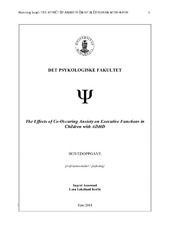The effects of co-occuring anxiety on executive functions in children with ADHD
Master thesis
Permanent lenke
https://hdl.handle.net/1956/16354Utgivelsesdato
2014-11-23Metadata
Vis full innførselSamlinger
- Faculty of Psychology [535]
Sammendrag
Children with Attention-Deficit/Hyperactivity Disorder (ADHD) are known to have deficits in executive functioning. There is an ongoing debate whether anxiety has an ameliorating effect on executive functions in these children or not. The purpose of the present study was to investigate the effect of high anxiety on executive functioning in children with ADHD and in a group of typically developing children. Based on the Attentional Control Theory we hypothesized that higher levels of anxiety would lead to longer response times (RT's) on inhibition and set-shifting as measured by the Color Word Interference Test (CWIT) from the Delis-Kaplan Executive Function System (D-KEFS). Methods: 74 children, divided into two groups (ADHD: n=40; controls: n= 34) performed D-KEFS CWIT. Results: Higher levels of trait-anxiety decreased the RT significantly on the measure of inhibition in children with ADHD and in the typically developing children. The children with ADHD had higher error scores of inhibition and set- shifting, but showed shorter set-shifting RT's than the controls. Conclusion: The study showed a significant positive association between trait anxiety and RT in inhibition in children with ADHD, and the children with ADHD showed a profile of predominantly inhibitory problems, and not set-shifting problems. Barn med ADHD er kjent for å ha vansker med eksekutiv fungering, og det er en pågående debatt om angst har en modererende effekt på slike vansker eller ikke. Målet med denne studien var å undersøke hvordan trekk- og tilstandsangst påvirker eksekutiv fingering hos barn med ADHD og normalfungerende barn. Basert på Attentional Control Theory" (ACT) var hypotesen vår at høyere grad av angst ville føre til lengre reaksjonstid på inhibisjon og kognitiv fleksibilitet (set-shifting) målt ved "Color Word Interference Test" (CWIT) fra Delis-Kaplan Executive Function System" (D-KEFS). Metode: 74 barn delt i to grupper (ADHD: n=40; kontrollgruppe: n=34) utførte D-KEFS CWIT, en nyere versjon av Stroop-testen som registrerer responstid og antall feil. Resultater: Resultatene viste at høy grad av trekk-angst hos både barn med ADHD og kontrollbarna påvirket responstiden positivt, motsatt fra hva som ble forventet, ved at høy grad av trekkangst korrelerte med en raskere inhibisjons-responstid. Barna med ADHD hadde flere feilskårer på målene av både inhibisjon og kognitiv fleksibilitet, men viste kortere responstid på kognitiv fleksibilitet. Konklusjon: Denne studien viser at høy trekk-angst har en statistisk signifikant positiv effekt på responstiden på inhibisjon hos barn med ADHD.
